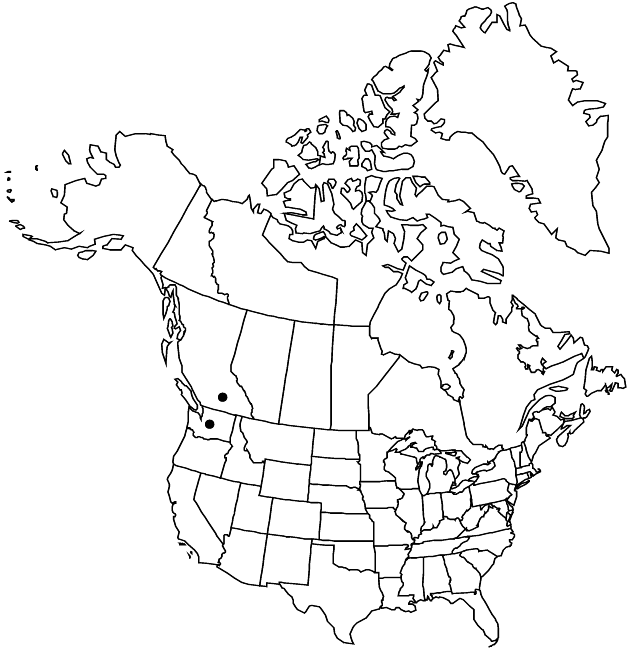Difference between revisions of "Eucephalus paucicapitatus"
Pittonia 3: 56. 1896.
FNA>Volume Importer |
imported>Volume Importer |
||
| (6 intermediate revisions by 2 users not shown) | |||
| Line 8: | Line 8: | ||
}} | }} | ||
|common_names=Olympic Mountain aster | |common_names=Olympic Mountain aster | ||
| − | |basionyms={{Treatment/ID/ | + | |special_status={{Treatment/ID/Special_status |
| + | |code=E | ||
| + | |label=Endemic | ||
| + | }} | ||
| + | |basionyms={{Treatment/ID/Basionym | ||
|name=Aster engelmannii var. paucicapitatus | |name=Aster engelmannii var. paucicapitatus | ||
|authority=B. L. Robinson | |authority=B. L. Robinson | ||
| + | |rank=variety | ||
| + | |publication_title=Proc. Amer. Acad. Arts | ||
| + | |publication_place=26: 176. 1891 (as engelmanni) | ||
}} | }} | ||
|synonyms={{Treatment/ID/Synonym | |synonyms={{Treatment/ID/Synonym | ||
|name=Aster paucicapitatus | |name=Aster paucicapitatus | ||
|authority=(B. L. Robinson) B. L. Robinson | |authority=(B. L. Robinson) B. L. Robinson | ||
| + | |rank=species | ||
}} | }} | ||
|hierarchy=Asteraceae;Asteraceae tribe Astereae;Eucephalus;Eucephalus paucicapitatus | |hierarchy=Asteraceae;Asteraceae tribe Astereae;Eucephalus;Eucephalus paucicapitatus | ||
| Line 30: | Line 38: | ||
|elevation=800–3300 m | |elevation=800–3300 m | ||
|distribution=B.C.;Wash. | |distribution=B.C.;Wash. | ||
| − | |discussion=<p>Eucephalus paucicapitatus is found on Vancouver Island, where it is very uncommon, and the Olympic Peninsula. It is closely related to E. gormanii.</p> | + | |discussion=<p><i>Eucephalus paucicapitatus</i> is found on Vancouver Island, where it is very uncommon, and the Olympic Peninsula. It is closely related to <i>E. gormanii</i>.</p> |
|tables= | |tables= | ||
|references= | |references= | ||
| Line 39: | Line 47: | ||
-->{{#Taxon: | -->{{#Taxon: | ||
name=Eucephalus paucicapitatus | name=Eucephalus paucicapitatus | ||
| − | |||
|authority=(B. L. Robinson) Greene | |authority=(B. L. Robinson) Greene | ||
|rank=species | |rank=species | ||
| Line 53: | Line 60: | ||
|publication title=Pittonia | |publication title=Pittonia | ||
|publication year=1896 | |publication year=1896 | ||
| − | |special status= | + | |special status=Endemic |
| − | |source xml=https:// | + | |source xml=https://bitbucket.org/aafc-mbb/fna-data-curation/src/2e0870ddd59836b60bcf96646a41e87ea5a5943a/coarse_grained_fna_xml/V19-20-21/V20_53.xml |
|tribe=Asteraceae tribe Astereae | |tribe=Asteraceae tribe Astereae | ||
|genus=Eucephalus | |genus=Eucephalus | ||
Latest revision as of 20:03, 5 November 2020
Perennials 20–55 cm (caudices woody). Stems ascending to erect, pilose or glandular-pubescent. Leaves: mid and distal blades elliptic to elliptic-oblong, 2–4 cm × 4–13 mm, sparsely scabrous to stipitate-glandular abaxially, moderately stipitate-glandular adaxially. Heads usually 2–4 in racemiform to corymbiform arrays, somtimes borne singly. Peduncles stipitate-glandular. Involucres turbinate-obconic, 7–9 mm. Phyllaries in 2–3 series (whitish), lance-linear (unequal), apices acute, abaxial faces stipitate-glandular. Rays 7–13(–21), white. Cypselae obconic, pilose; pappus bristles in 2 series, ± barbellate.
Phenology: Flowering Jul–Aug.
Habitat: Open subalpine meadows or scree slopes
Elevation: 800–3300 m
Discussion
Eucephalus paucicapitatus is found on Vancouver Island, where it is very uncommon, and the Olympic Peninsula. It is closely related to E. gormanii.
Selected References
None.
